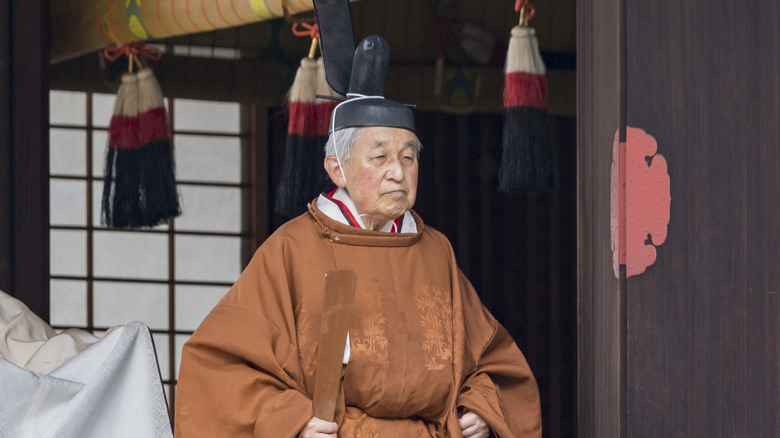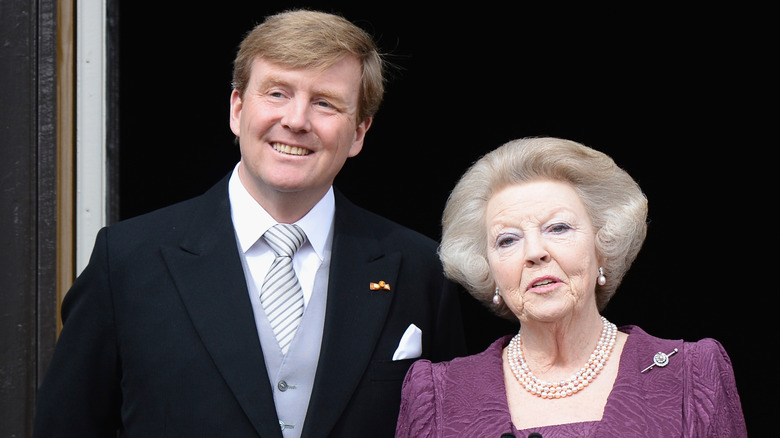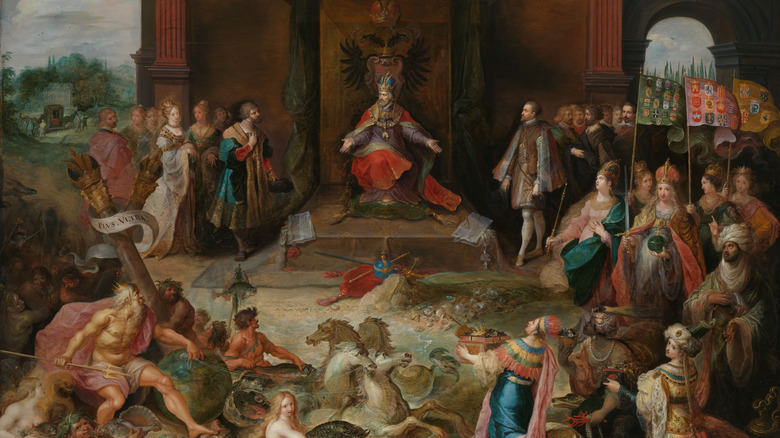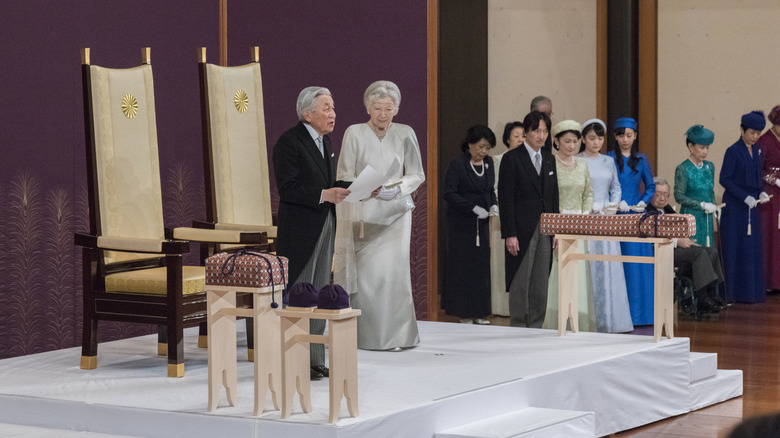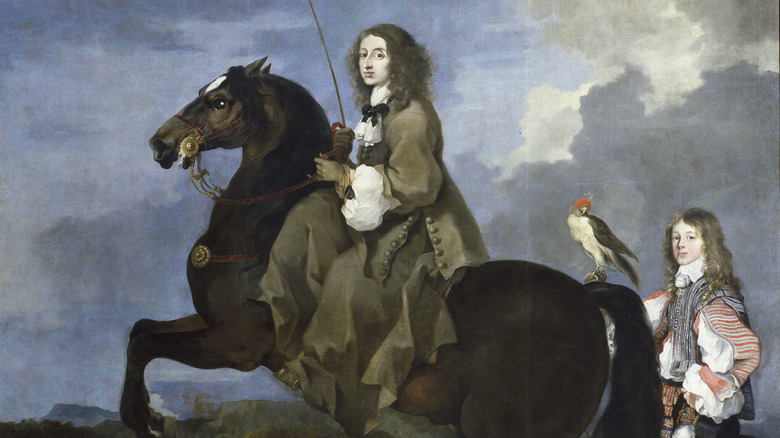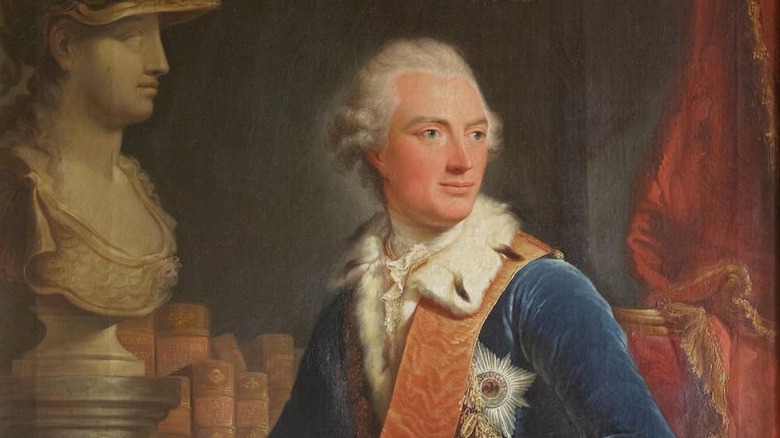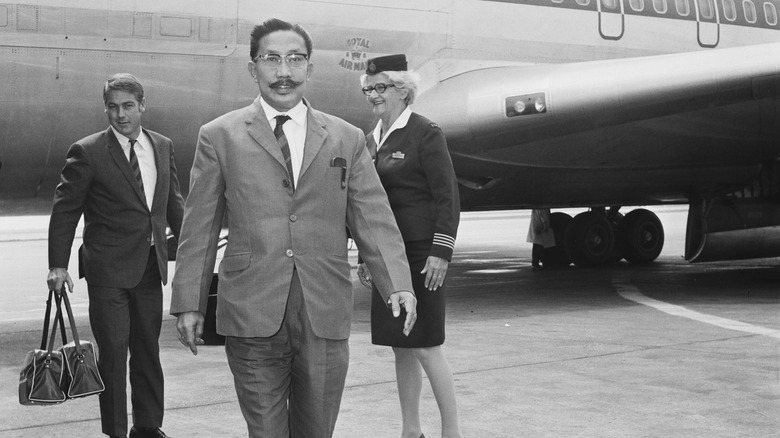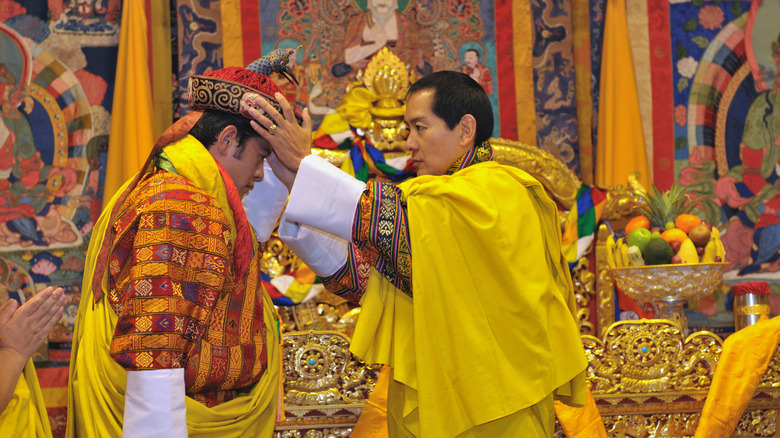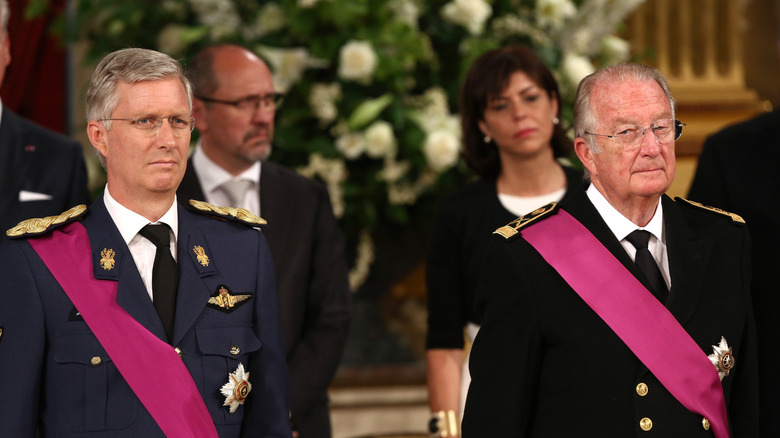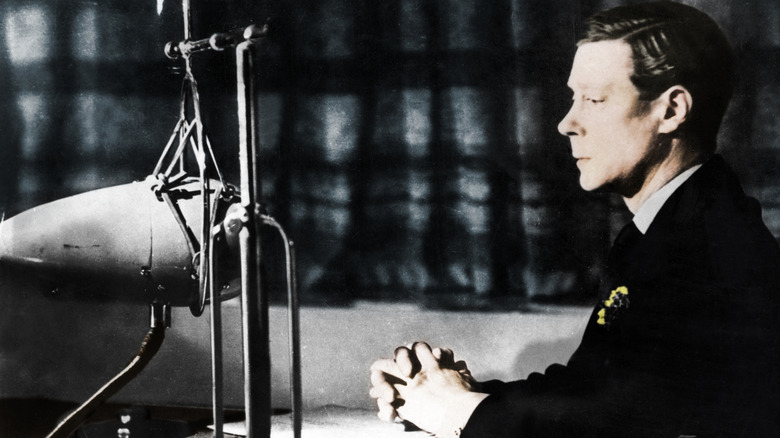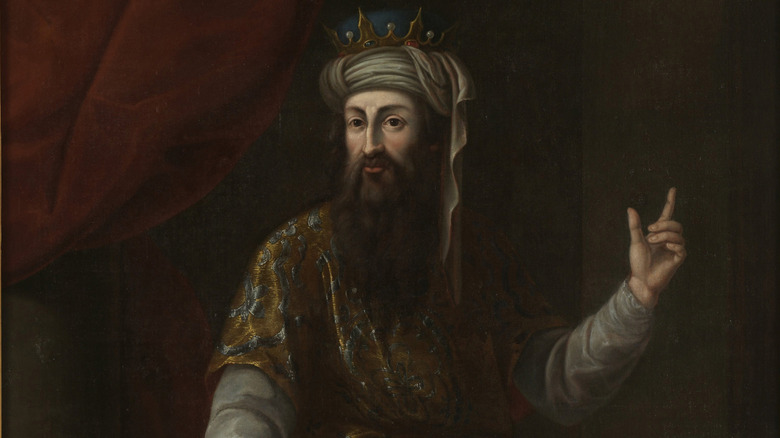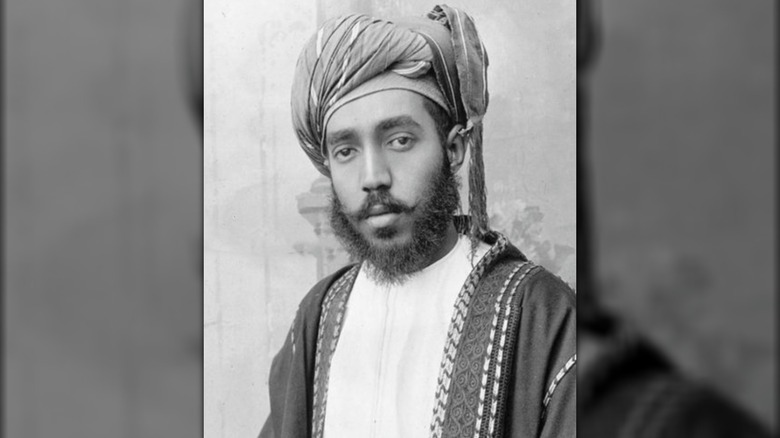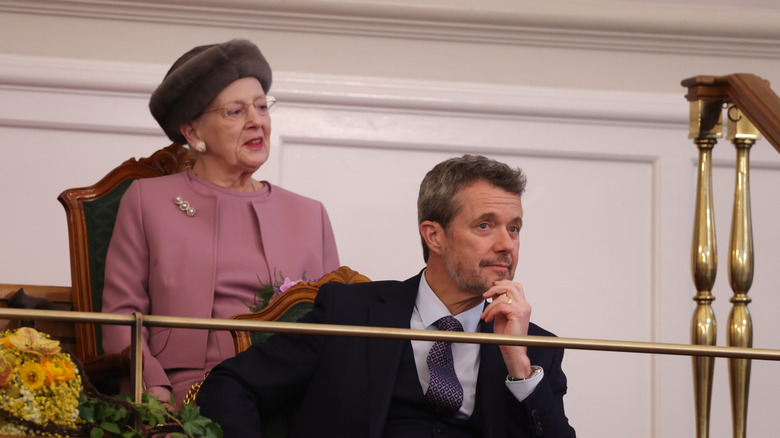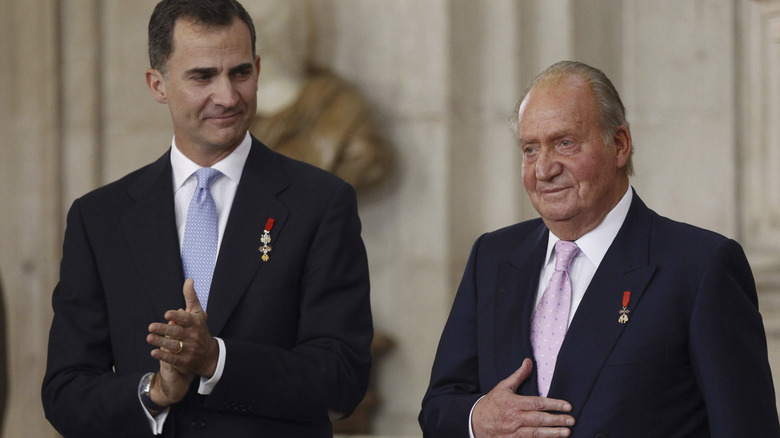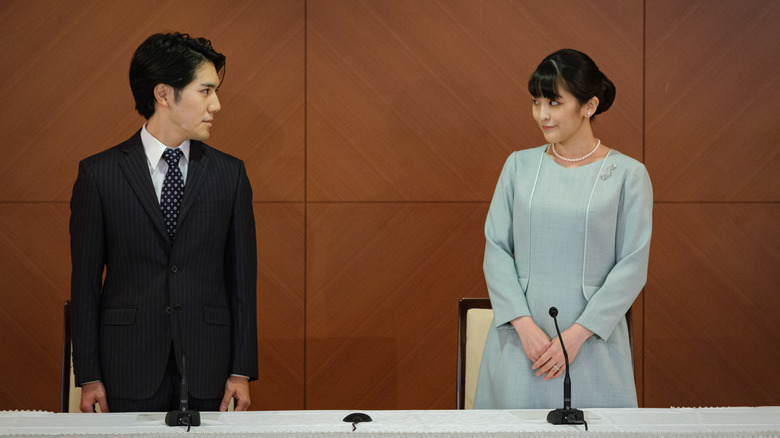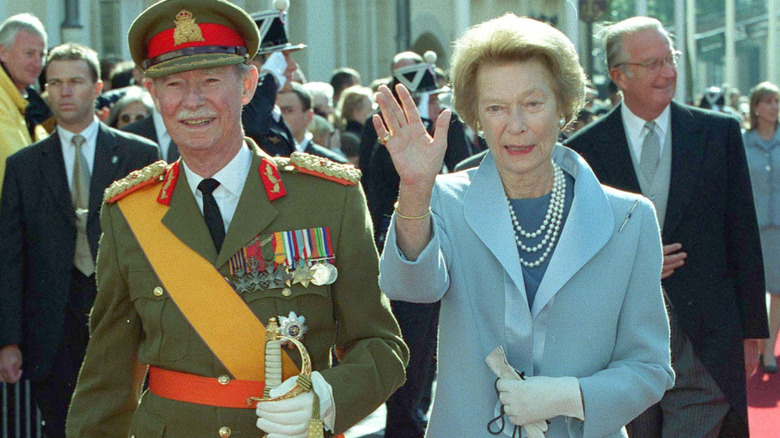Royals Who Gave Up Their Titles
Even with all the power, riches, and big drafty castles they could ever want at their disposal, sometimes monarchs decide it's time to hang up their crown. While plenty of monarchs have been deposed against their will, occasionally, throughout history, royals have chosen to step down, giving up their royal titles voluntarily.
Many people might be under the impression that Britain's Prince Harry and Meghan Markle did this. That's actually wrong in two ways: They didn't want to step down from the royal family completely — they were forced — and they didn't actually give up their titles. Famously, the royals left the country to move to America, and also agreed to stop using their HRH styling in certain situations. But when Queen Elizabeth II died, their children moved up in the line of succession to the throne. This meant their son and daughter were now allowed to use prince and princess titles, which Harry and Meghan immediately began doing. And they are holding fast to the Sussex title, too.
Plenty of other royals really did happily step down, though. So, what is the process involved in deciding that one does not want to be king or queen anymore? How did their subjects feel about the announcements? And what did some of these monarchs choose to do after they abdicated? Here are some modern and historical royals who gave up their titles.
Beatrix, Queen of the Netherlands
The British Royal family, probably the most well-known monarchy in Europe, sees abdication as a negative due to some trauma left over from the last time one took place there. However, in many other royal families on the Continent, abdication is a common thing to do once a monarch gets older. For example, take Beatrix, the former Queen of the Netherlands. The Dutch queen came to power in 1980, when she took the throne from her mother, who also chose to abdicate.
Over three decades later, just before she turned 75 in 2013, Queen Beatrix told the world that she, too, would abdicate to pass on the throne to a new generation. On January 28, 2013, the queen announced that she would abdicate on April 30, the 33rd anniversary of her accession, with the throne passing to her eldest son, the then-45-year-old Prince Willem-Alexander (pictured).
In explaining her decision to the Dutch nation, Beatrix stated, "I have always considered it a special privilege to have spent a large portion of my life in the service of our country and in fulfilling the task of monarch. ... This wonderful task has never given me anything but great satisfaction." She continued, "I do not abdicate, therefore, because the task has become an onerous one, but because I am convinced the responsibility for our country should now be placed in the hands of a new generation" (unofficial translation via Dutch News).
Charles V, Holy Roman Emperor
Royals have been looking around at their situations pretty much since humans invented monarchy and coming to the conclusion that maybe all that power wasn't worth it anymore. Charles V, Holy Roman Emperor, found himself in that position in 1556. While he wasn't forced out by a coup or invasion or even a power-hungry relative, he just wasn't up to the job of being king in his old age.
Part of the problem was that Charles was actually two kings in one. He was Charles V of the Holy Roman Empire and Charles I of Spain. By the time he was in his mid-50s, he was broken by gout, sick of dealing with increasingly complicated political problems in Europe, and feeling his age. So Charles decided to divide his various kingdoms between his brother and son. According to "The Emperor Charles V," by Edward Armstrong, at his abdication, Charles said, "My son, I give, yield, and make over to you my countries here ... I commend to you the religion of the Holy Church, good police and justice, and I beg all the Estates to remain in close union." Weepy, he turned to the others assembled and said, "Gentlemen, you must not be astonished if, old and feeble as I am in all my members, and also from the love I bear you, I shed some tears."
The former monarch retired to the Monastery of San Jerónimo de Yuste, where he died in 1558.
Akihito, Emperor of Japan
Akihito became Emperor of Japan in 1989, following the death of his father, Hirohito. By 2016, however, Akihito was in his 80s, with a history of serious health problems. "When I consider that my fitness level is gradually declining, I am worried that it may become difficult for me to carry out my duties as the symbol of the State with my whole being as I have done until now," the emperor told his people, in what was only the second public address he had ever given (via CNN).
While there had been rumors for some time that the emperor was looking to step down, this was as close as he could come to a confirmation. Akihito could not come right out and say he wanted to abdicate, because that could be considered a political statement, which the emperor is barred from making. Also, no emperor had abdicated in 200 years, and there was no legal basis for it. A new law would need to be passed before it could happen. It helped that most of the Japanese population agreed that abdication should be legal, and the necessary changes were made in 2017.
Akihito stepped down in 2019 (pictured), handing the Chrysanthemum Throne to his son Naruhito. "I am deeply grateful for the people that accepted me as a symbol and supported me," Akihito said during his abdication ceremony (via BBC News). "I pray, with all my heart, for peace and happiness for all the people in Japan and around the world."
Christina, Queen of Sweden
For much of history, it was taken for granted that a single queen in charge of a country must be in want of a king. Christina, Queen of Sweden, was raised from childhood to take over ruling from her father, who died in 1632, when she was only 5 years old. But despite being well prepared and well educated enough to reign on her own, she was still constantly pressured to marry by her advisors.
The queen seemed slightly obsessed with — and confused by — the concept of love. She corresponded with the philosopher Descartes about the subject at length. It seems she did not find the answers she was seeking. According to the official website of The Royal Palaces of Sweden, Christina tried to explain her feelings to her advisors, saying, "Were it in my power to marry, I would willingly do so ... But I say this explicitly, that it is impossible for me to marry. Such is the nature of the matter. I cannot give my reasons, but my heart is not in it. I have prayed diligently to God, but in vain." Modern readers and historians have sometimes interpreted this to mean that Christina was a lesbian.
However, it is also possible that Christina put off marrying for another reason. Sweden was a Lutheran country, but as early as 1651, Christina started flirting with Catholicism. She would never be allowed to convert if she stayed monarch, so she gave up the throne to her (male) cousin.
Alexander, Margrave of Brandenburg-Ansbach
It's a cliche for a reason: A rich older man marries for the second time to a younger wife and starts making some crazy life decisions. Usually, however, the man in question is not powerful enough to upend the lives of thousands of others in the process. But most men were not Alexander, Margrave of Brandenburg-Ansbach.
The margrave reigned over two principalities in what is now Germany. In his 1904 work "Caroline, the Illustrious Queen-Consort of George II, and Sometime Queen-Regent: A Study of Her Life and Time," author William Henry Wilkins is exceedingly petty about the areas Alexander ruled, saying that they contributed very little to history and the margraves didn't even manage to marry important people. In 1786, Margrave Alexander was living apart from his invalid wife when he met the English Countess of Craven, Elizabeth Berkeley. She was traveling the Continent to get away from her own estranged husband. The two hit it off and corresponded for years, until, quite conveniently for them, both of their spouses died within months of each other in 1791.
Once the couple married, the margrave decided to sell the two German principalities he ruled over to Prussia (he did not ask his subjects what they thought about this arrangement) and moved with Elizabeth to England. There, they bought homes in London and in the country, and the childless Alexander treated her son Keppel as his own. The former monarch died in 1806 at his English country estate.
Omar Ali Saifuddien III, Sultan of Brunei
Usually, when a monarch makes the huge decision to give up their throne voluntarily, they plan on stepping back to live a life of quiet retirement. But for Omar Ali Saifuddien III, Sultan of Brunei, abdicating his throne in favor of his son was really just exploiting a legal loophole in an attempt to keep power.
The country of Brunei had a long and complicated history, and then the British showed up and claimed it, like they were wont to do. In 1888, Brunei became a British "protectorate," and in 1906, they installed an advisor to the sultan who pretty much ruled in all but name. After the discovery of oil and invasion by the Japanese during WWII, Brunei was finally on the path to independence by the time Omar came to power in 1950. But the British wanted the country to be somewhat democratic, and in 1959, Omar signed an agreement making the country's independence contingent on a move toward democracy, under British direction.
While Omar was bound by the terms of this agreement, his son was not. So the sultan abdicated in favor of Hassanal Bolkiah Muʿizzaddin Waddaulah in 1967. The new sultan was not legally bound by the terms of the agreement, which meant, in theory, he had a lot more power. In reality, his father, the former sultan, maintained a lot of control over the country until he died in 1986, two years after the country gained full independence.
Jigme Singye Wangchuck, King of Bhutan
It isn't often that an absolute monarch has to convince their subjects that the monarch should have less power. But that was the case with Jigme Singye Wangchuck, King of Bhutan. After ascending to the throne aged just 16 in 1972, the king decided that he wanted Bhutan to go from an absolute monarchy to a constitutional monarchy. He was open about his plans and this eventuality for years before stepping down to complete the process.
Announcing his decision to abdicate in favor of his son to a crowd of thousands of his subjects, Wangchuck explained, "The best time to change a political system is when the country enjoys stability and peace. Why wait for a revolution? Why crown an heir only when the nation is in mourning for a late king?" (via Al-Jazeera). While he had been preparing the country for this step for years, it still came as a shock. Kinley Dorji, editor of Bhutan's national newspaper, said, "The entire nation was bewildered when the king made this surprise announcement of stepping down ... The people of Bhutan did not really expect this historic and dramatic decision to come so early."
In fact, it was to come even earlier. While Wangchuck said in 2005 that he would step down in 2008, the following year he told his council of ministers it would happen sooner, so his son could gain experience leading by the time of the elections in 2008. Wangchuck is pictured above crowning his son.
Albert II, King of the Belgians
It turned out that 2013 was a big year for abdications in European royal houses. Queen Beatrix of the Netherlands abdicated in April, and less than three months later, in a neighboring country, Albert II, King of the Belgians, also abdicated. Unlike Beatrix, who waited several months after her announcement to step down, in order to do so on the 33rd anniversary of her ascension, Albert did not bother waiting just a few more weeks to mark his 20th year on the throne, which would have occurred on August 9. His abdication ceremony took place on July 21, less than three weeks after he announced his intentions.
None of Belgium's six rulers had ever abdicated before, but Albert felt it was important for the politically divided country to have a king who was fully capable of fulfilling his (mostly ceremonial) role in government. "I have noticed how my age and my health have not permitted me to exercise my duties the way I would like to," the king explained (via CNN).
It must have been poignant as he thought about his reign on the day he passed the throne to his son Philippe (pictured). Albert only became king because his brother had died without any direct heirs. Then, he was caught up in a paternity scandal at the turn of the century. Stepping down just when he did might also have been an attempt to avoid a renewed court case over the claim by his alleged daughter.
Edward VIII, King of the United Kingdom
Perhaps the most famous abdication in history is that of Edward VIII, King of the United Kingdom. This is often sold as a grand love story — he had fallen in love with the divorced American Wallis Simpson, and the British establishment wouldn't let him marry her. Choosing his love over his duty, Edward stepped down and became the Duke of Windsor.
To the almost total shock of a country that had been kept in the dark, Edward took to the airwaves on December 11, 1936, saying, "...until now it has not been constitutionally possible for me to speak. A few hours ago, I discharged my last duty as King and Emperor, and ... I have been succeeded by my brother, the Duke of York" (via British Pathé). He explained his reasons for doing so: "I have found it impossible to carry the heavy burden of responsibility and to discharge my duties as King as I would wish to do without the help and support of the woman I love. ... I have made this, the most serious decision of my life, only upon the single thought of what would, in the end, be best for all."
In reality, Edward hated being king, and Wallis might have been as good an excuse as any to give up the throne. She had signed a document declaring she had no desire to marry him just days before his announcement. However, they would end up getting married six month later.
Amadeus VIII, Duke of Savoy
Amadeus VIII, Duke of Savoy, did pretty well for himself as the leader of a tiny country. He managed to unite all of Savoy as one independent nation — not through war, but by buying up lands from other aristocratic lines. He arranged advantageous marriages for himself and his children, kept his country out of various European conflicts, and managed to become rich and powerful. But things eventually took a turn for the worse. After becoming a widower in the 1430s, he decided to retire.
At this point, Amadeus did not fully step down as Duke of Savoy, however. He made his son regent and went off with a few friends to live as a monk in a religious order that he had invented, but Amadeus still largely kept control of his country. While this might seem a very aristocratic version of monasticism, by all accounts, Amadeus was very religious and a devoted Catholic. So it's not surprising that when he got the chance to be pope, he took it.
The Catholic Church had been in disarray for a while at this point, with various schisms and antipopes dividing the faithful. Amadeus managed to get himself selected as Pope Felix V in 1439, after the Council of Basel (which he largely controlled) deposed Pope Eugenius IV. Amadeus then fully renounced the throne of Savoy and ruled as pope for nine years before being deposed himself. Today, he is considered the last antipope by the Catholic Church.
Taimur bin Feisal, Sultan of Muscat and Oman
Taimur bin Feisal, Sultan of Muscat and Oman, came to the throne in 1913 on the death of his father. It was already clear to those around him that the new sultan was weak. In 1915, what was effectively a civil war broke out in the country, and Taimur only managed to keep his throne because the British sent troops to fight off the rebels. Despite fighting the First World War at the same time, Britain maintained a troop presence in Oman until the leader of the rebel fighters died in 1920. This should have been when things got easier for Taimur. Instead, he tried to abdicate.
It turned out that Taimur was also aware of how bad he was at being sultan, and he allegedly never really wanted to be in charge to begin with. The country had faced one problem after another in his short reign, and he wanted no more of it. But the British, who had just helped save his throne, were not having it.
While he was not allowed to step down, Taimur did come to an agreement that said he only had to live in Oman three months a year and set up a council to take over much of the governing duties from him. By 1929, he was again talking about abdicating, although the British managed to push this back until 1932, when Taimur finally got to give up the throne to his 21-year-old son.
Margrethe II, Queen of Denmark
It had been a few difficult years for Margrethe II, Queen of Denmark. In 2018, Prince Henrik, her husband of over 50 years, died. In 2022, in the midst of inter-family drama, the queen suddenly announced she was stripping the titles away from her younger son's children. In 2023, her elder son was accused of cheating on his wife.
Then there were all of Queen Margrethe's health issues. During the second half of her reign, she needed multiple surgeries on her knees and back, and was treated for cervical cancer. In 2023, her ongoing back pain necessitated another lengthy and dangerous operation.
Although she came through the procedure just fine, the reality of her situation seemed to have sunk in. Margrethe announced to the nation in December 2023, "The surgery naturally gave rise to thinking about the future — whether the time had come to leave the responsibility to the next generation. I have decided that now is the right time. On January 14, 2024 — 52 years after I succeeded my beloved father — I will step down as queen of Denmark" (via The Independent). This was not a decision to be taken lightly: The 900-year-old Danish monarchy had never seen an abdication before. And despite being 83, and the longest reigning monarch in Europe since the death of the United Kingdom's Elizabeth II in 2022, no one even knew she was considering the move. On her abdication, the Danish throne passed to Margrethe's eldest son, Prince Frederik (pictured).
Saad al-Salim al-Sabah, Emir of Kuwait
When it comes to monarchs who gave up their titles voluntarily, Saad al-Salim al-Sabah, Emir of Kuwait, may hold the record for the shortest reign. He ruled that country for only nine days before announcing his intention to step down in 2006. While it was his choice to do so, attempting to hold on to power would probably have rocked the small country.
Saad got the top job when the previous emir died, but the problem was that the country's prime minister, Sheik Sabah al-Ahmad al-Sabah, had been de facto ruler for years. This divided the royal family over who should have gotten the throne. The drama threatened to explode, but right before the country's parliament was going to vote on the issue, a note arrived from Saad. The elderly emir, who was rumored to have Alzheimer's, admitted his age and health meant he couldn't do the job, and offered to step down. "An agreement has been reached in the family and he will sign the abdication papers tomorrow," lawmaker Nasser al-Saneh told the AP (via Al-Jazeera).
The Kuwait Parliament's then-speaker Jassem al-Khorafi said (via BBC News), "The emir remains in the hearts of all Kuwaiti people. We all love, appreciate, and respect him, but this is God's will. We can only wish him a quick recovery." Members of the government in the country were very proud that the issue had been solved with diplomacy.
Juan Carlos I, King of Spain
While it was his own decision to abdicate in 2014, Juan Carlos I, King of Spain, knew that doing so was necessary if there was any chance of saving the monarchy as an institution. By that point, the king was neck-deep in a major financial scandal, and many Spaniards were calling for the end of the monarchy in their country. Sensing things were not going to improve for him, the king stepped down in favor of his more popular son.
Like many mostly ceremonial monarchs in Europe, the king of Spain doesn't have much power. But Juan Carlos was heavily symbolic in his nation, due to his becoming king when the monarchy was restored after the fall of dictator Francisco Franco in 1975. The monarch alluded to this when he announced his intention to abdicate, saying, "When I was proclaimed king, nearly four decades ago, I took on a firm commitment to serve Spain's general interest, moved by the desire to make citizens the agents of their own destinies and for our nation to become a modern democracy..." (via El País). He continued, "Guided by the firm belief that I am doing the best service to Spaniards, and now that I have recovered physically [from health issues] and gone back to my institutional activities, I have decided to bring my reign to an end and abdicate the Spanish crown."
Juan Carlos' son became Felipe VI on June 19, 2014 (pictured). The former king left Spain for a time, but scandal continued to follow him.
Hamad bin Khalifa Al Thani, Emir of Qatar
Once Hamad bin Khalifa Al Thani became Emir of Qatar in 1995 — in a bloodless coup where he overthrew his own father — he spent almost the next two decades making the tiny Middle Eastern country more powerful and wealthier than it had ever been. He was very successful in this endeavor, but when he announced in 2013 that he would be abdicating in favor of his son, Sheik Tamim bin Hamad Al Thani, his decision shocked everyone. While many monarchs (including two others in 2013 alone) choose to abdicate because of their advancing years, Hamad was a relatively spry 61 years old at the time.
But it seemed like the emir had done what he set out to do and was content with that as his legacy. According to Qatar expert Olivier Da Lage, "When he came to power in 1995, Sheikh Hamad had a goal to place Qatar on the world map by exploiting the gas resources which his father, Sheikh Khalifa, did not develop for fear it would change the emirate's society. Eighteen years on, he has finished the job" (via The Independent).
Despite being absolute ruler of a country with no press freedom, Hamad said in his abdication announcement, "God Almighty is aware that I had not desired power for the sake of power, nor endeavored to rule for personal motives. It has always been the nation's interest ... that we lead through a new chapter" (via Al-Jazeera).
Princess Mako of Akishino
Japan's Princess Mako's engagement was more controversial than even Prince Harry and Meghan Markle's was in the U.K. Princess Mako's college sweetheart, Kei Komuro (pictured), was a commoner, and the rule is that any royal woman has to give up her title if she marries outside of the Imperial family. The princess was well aware of this (her older sister had also married a commoner), but had no problem giving it all up for love.
The couple met at university. "First, I was attracted by his bright smiles like the sun," Mako said, according to the AP. As their relationship progressed, she said she learned he was "a sincere, strong-minded, hard worker, and he has a big heart." They managed to make it through a long-distance relationship, and in 2013, Komuro proposed. They kept this secret for several more years. Once their engagement was announced in 2017, it caused such backlash that they were forced to delay the wedding for another four years. People complained about his hairstyle and allegations that his mother owed her ex-fiance money.
According to BBC News, when announcing they had finally married in a simple ceremony in 2021, Mako said, "I am very sorry for the inconvenience caused, and I am grateful for those ... who have continued to support me. For me, Kei is irreplaceable — marriage was a necessary choice for us." The couple moved to the U.S. and welcomed a baby in 2025.
Jean, Grand Duke of Luxembourg
Luxembourg might be famous for being a tax haven and one of the tiniest countries in Europe, but less well known is that abdicating is a common royal occurrence there. Giving one's heir more power in preparation for stepping down from the throne is a bit of a tradition in the small country. In 1919, Marie-Adélaïde abdicated and her sister Charlotte became Grand Duchess. She gave birth to Jean in 1921, and abdicated in his favor in 1964. Jean (pictured) was Grand Duke of Luxembourg until he chose to continue this tradition, abdicating for his own son Prince Henri in the year 2000, after ruling over the duchy for more than 35 years.
In a speech before his abdication, Jean explained how proud he was of Luxembourg's achievements over the last several decades: "Never before in its history had our country enjoyed the worldwide recognition it enjoys today. Never before has our standard of living been as high and our social security system as efficient as it is today. Never before have so many people worked and lived in our country, and never before has our country been so culturally rich" (via the Grand Ducal Court of Luxembourg).
The tradition of abdication continues well into the 21st century. During his Christmas Eve speech in 2024, the 69-year-old Grand Duke Henri announced he would begin handing power over to his son, Prince Guillaume, in October 2025, in preparation for eventually stepping down as grand duke.
